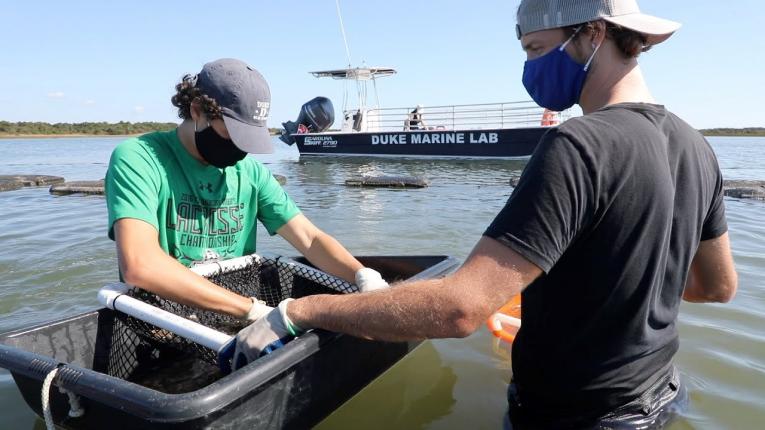Focus of Study
Marine Science and Conservation (MARSCI) encompasses the interdisciplinary study of marine systems, their protection, and their governance. Coursework and field experiences will ground students in the relevant natural, physical and social science disciplines, and prepare them to dive deeply into specific issues facing our oceans and maritime communities. The electives for the Marine Science and Conservation majors and minor, offered at the Duke Marine Lab in Beaufort, N.C., highlight an experiential and immersive academic experience.
The Marine Science and Conservation major is designed to be flexible, allowing students to build proficiency in many aspects of marine science while affording ample opportunity for specialization in a field or topic of interest. Students can choose to pursue independent research projects potentially leading to Graduation with Distinction.
A.B. in Marine Science & Conservation
This degree is designed to be a general liberal arts major for students interested in studying social science, policy and governance related to oceans.
Co-Requisites – 4 required from the following options:
Choose 3 from the following:
- Chemistry: CHEM 101DL or 110DL
- Chemistry: CHEM 201DL or 210 DL (CHEM 201L/210L is recommended, but not required)
- Biology: BIOLOGY 201L or 202L or 203L
- Physics: PHYSICS 121L or 141L or 151L or 161D
- Economics: ENVIRON 155 or (ECON 101 + 201) or (PUBPOL 155+303)
Choose 1 from the following:
- Lab Calculus I & Lab Calculus II: (MATH 111L + 112L)
- Introductory Calculus II: MATH 122L
- Statistics: STA 101 or 102 or 199 or equivalent
Gateway & Core Courses – 4 Courses
All of the following courses are required. There is not a required sequence for these courses.
Gateway Course
- MARSCI 201 Future of the Oceans: From Science to Policy: Offered spring semester in Durham, 1.0 credit, (STS), (SS)
The ocean covers two-thirds of the planet, forming the backbone of healthy ecosystems and many growing economies worldwide. Despite this importance, we know far less about the oceans than terrestrial environments. This course provides an overview of why the oceans matter, including the many ways people use and depend on the oceans. We will discuss the major issues that threaten our oceans, and students will explore emerging solutions to these challenges of changing ocean use using market-based, scientific, and policy approaches. Course will include an optional weekend field trip to the Duke Marine Lab in Beaufort.
Core Courses
- MARSCI 202 Marine Biology & Ecology: Currently offered fall semester in Durham.
- MARSCI 203 Marine Social Science: Will be offered fall 2025 taught by Rebecca Vidra. A Beaufort option will be announced soon.
- MARSCI 204 Integrative Oceanography: A Beaufort section of this course will be offered in the fall semester in Beaufort. Please reach out to DUS Tom Schultz (tom.schultz@duke.edu) if you do not think you will be able to take this course in Beaufort during the fall semester.
Electives – 5 Courses
Electives provide an opportunity to pursue your individual academic interests while gaining depth in a specific focus area. Click here for a pdf list of Marine Science and Conservation electives. Students will select five electives from faculty-curated course lists to satisfy the following criteria:
- At least three of the five electives should be MARSCI courses at the 200-level or above.
- Up to two courses can be approved alternative electives from other Duke departments.
- No more than one non-Duke course can be used as an elective.
- Courses can be a mix of natural, physical and social sciences.
- A maximum of two independent study projects with MARSCI faculty can be used.
Capstone Experience – 1 Course
Choose one of the following options:
- Capstone Course: MARSCI 350S: The Capstone is designed to allow students to leverage the knowledge they have gained during their pursuit of the major and apply this knowledge to real-world, or real-ocean, problems. At the beginning of the semester, students will select a major issue facing the oceans (e.g., overfishing, governance in areas beyond national jurisdiction, climate change, acidification, loss of biodiversity). This issue will then be the focus of project teams for the remainder of the semester. Each team will tackle a set of specific topics within the scope of the broader issue.
- Graduation with Distinction (GWD): The Marine Science and Conservation degree offers a Graduation with Distinction option. Interested students with a 3.0 grade point average overall and a 3.2 grade point average in the Marine Science and Conservation major should apply by the beginning of their senior year. Graduation with Distinction requirements, deadlines and application
Major Worksheet
A.B. Major Requirement Worksheet
B.S. in Marine Science & Conservation
The B.S. in Marine Science and Conservation is designed for students wishing to pursue a career in ocean sciences including graduate studies.
Co-Requisites – 5 required from the following options:
Choose 4 from the following:
- Chemistry: CHEM 101DL or 110DL
- Chemistry: CHEM 201DL or 210DL (CHEM 201L/210L is recommended, but not required)
- Biology: BIOLOGY 201L or 202L or 203L
- Physics: PHYSICS 121L or 141L or 151L or 161D
- Economics: ENVIRON 155 or (ECON 101 + 201) or (PUBPOL 155+303)
Choose 1 from the following:
- Lab Calculus I & Lab Calculus II: (MATH 111L + 112L)
- Introductory Calculus II: MATH 122L
- Lab Calculus I & Statistics: MATH 111L & STA 101 or 102 or 199 or equivalent
Gateway & Core Courses – 4 Courses
All of the following courses are required. There is not a required sequence for these courses.
Gateway Course
- MARSCI 201 The Future of the Oceans: From Science to Policy: Currently offered spring semester in Durham, 1.0 credit, (STS), (SS)
The ocean covers two-thirds of the planet, forming the backbone of healthy ecosystems and many growing economies worldwide. Despite this importance, we know far less about the oceans than terrestrial environments. This course provides an overview of why the oceans matter, including the many ways people use and depend on the oceans. We will discuss the major issues that threaten our oceans, and students will explore emerging solutions to these challenges of changing ocean use using market-based, scientific, and policy approaches. Course will include an optional weekend field trip to the Duke Marine Lab in Beaufort.
Core Courses
- MARSCI 202 Marine Biology & Ecology: Currently offered fall semester in Durham.
- MARSCI 203 Marine Social Science: Will be offered fall 2025 taught by Rebecca Vidra. A Beaufort option will be announced soon.
- MARSCI 204: Integrative Oceanography: A Beaufort section of this course will be offered in the fall semester in Beaufort. Please reach out to DUS Tom Schultz (tom.schultz@duke.edu) if you do not think you will be able to take this course in Beaufort during the fall semester.
Electives – 5 Courses
Electives provide an opportunity to pursue your individual academic interests while gaining depth in a specific focus area. Click here for a pdf list of Marine Science and Conservation electives. Students will select five electives from faculty-curated course lists to satisfy the following criteria:
- At least three of the five electives should be MARSCI courses at the 200-level or above.
- Up to two courses can be approved alternative electives from other Duke departments.
- No more than one non-Duke course can be used as an elective.
- Courses can be a mix of natural, physical and social sciences.
- A maximum of two independent study projects with MARSCI faculty can be used.
Capstone Experience – 1 Course
Choose one of the following options:
- Capstone Course: MARSCI 350S: The Capstone is designed to allow students to leverage the knowledge they have gained during their pursuit of the major and apply this knowledge to real-world, or real-ocean, problems. At the beginning of the semester, students will select a major issue facing the oceans (e.g., overfishing, governance in areas beyond national jurisdiction, climate change, acidification, loss of biodiversity). This issue will then be the focus of project teams for the remainder of the semester. Each team will tackle a set of specific topics within the scope of the broader issue.
- Graduation with Distinction (GWD): The Marine Science and Conservation degree offers a Graduation with Distinction option. Interested students with a 3.0 grade point average overall and a 3.2 grade point average in the Marine Science and Conservation major should apply by the beginning of their senior year. Graduation with Distinction requirements, deadlines and application
Major Worksheet
B.S. Major Requirement Worksheet
Minor in Marine Science & Conservation
The minor will allow students to explore their intellectual interests in marine sciences in addition to their own major. The minor consists of five courses.
Minor Requirements – 5 Courses
Gateway Course – 1 Course
- MARSCI 201 The Future of the Oceans: From Science to Policy: Currently offered spring semester in Durham, 1.0 credit, (STS), (SS)
The ocean covers two-thirds of the planet, forming the backbone of healthy ecosystems and many growing economies worldwide. Despite this importance, we know far less about the oceans than terrestrial environments. This course provides an overview of why the oceans matter, including the many ways people use and depend on the oceans. We will discuss the major issues that threaten our oceans, and students will explore emerging solutions to these challenges of changing ocean use using market-based, scientific, and policy approaches. Course will include an optional weekend field trip to the Duke Marine Lab in Beaufort.
Core Course – 1 Course
Choose 1 of the following core courses:
- MARSCI 202 Marine Biology & Ecology: Offered fall semester in Durham.
- MARSCI 203 Marine Social Science: Will be offered Fall 2025 taught by Rebecca Vidra. A Beaufort option will be announced soon.
- MARSCI 204 Integrated Oceanography: A Beaufort section of this course will be offered in the fall semester in Beaufort. Please reach out to DUS Tom Schultz (tom.schultz@duke.edu) if you do not think you will be able to take this course in Beaufort during the fall semester.
Electives – 3 Courses
- Choose three MARSCI courses as electives at the 200-level or above.
- Only one independent study with MARSCI faculty can be used toward the minor.
Program Hallmarks
While not mandatory, students pursuing a major in Marine Science & Conservation are encouraged to take advantage of the wealth of opportunities available through our coastal campus at the Duke University Marine Lab, in Beaufort, NC.
- Experiential learning in the marine environment
- Small-group learning experiences
- One-on-one interactions with faculty
- Emphasis on research
- Travel courses in Australia, Mexico, Panama, Puerto Rico, Singapore
Your Future
While many undergraduates choose an A.B. or B.S. in Marine Science and Conservation in pursuit of careers in marine science, policy or conservation, many others seek careers in medicine, law, finance, engineering, public service, education or management. What they learn through our curriculum prepares them for success wherever their talent leads.
Duke Marine Lab: Open to All Majors
Students from all disciplines—not just marine science—can study at the Duke University Marine Lab (DUML) for a summer or a semester. The Marine Lab experience emphasizes small classes, intensive research experiences, immersion in field work and the opportunity to sample other maritime environments through travel courses.
Related News
-
March 7, 2025
-
October 19, 2023
















